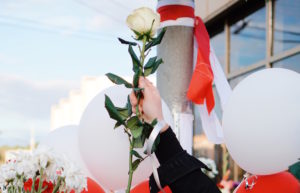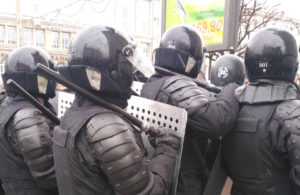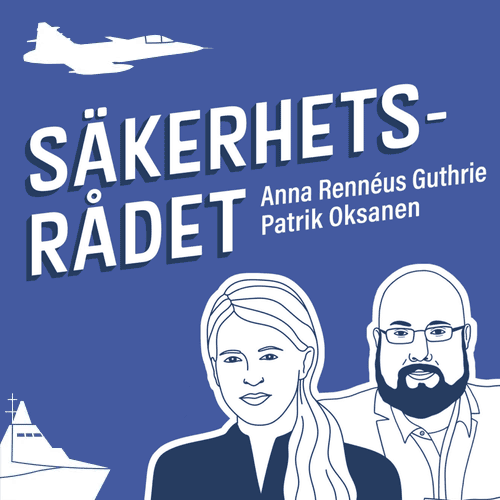This article is part of the Let The World Hear Project, which is a collaboration between Stockholm Free World Forum’s webzine Säkerhetsrådet and a number of Belarusian volunteers. Together we have gathered stories from victims of the dictatorship regime in 2020. The world must know what happened.
Read more about the project here.
This is the story of 42-year-old Ivan from Minsk. He is a journalist who was arrested for having filmed the post-election protests on the 11th of August 2020.

During protests. Photo: Artem Podrez/Pexels
It all began on Tuesday, 11 August, when our car was stopped by the traffic police. Two men from the OMON then approached us demanding to show them our mobile phones. Both my friend Pavel and I had photos from the protests and videos that I made for the Zviazda TV channel. We were immediately tied up and thrown into an avtozak. They yelled at us and started beating us. Within two hours, the wagon was packed with new detainees, and everything was happening according to the exact same scenario: they threw a man into the wagon, beat him up, and locked him up in a so-called “glass” – a small cell designed for one person. It all resembled a scene from a thriller movie, whose screenwriter, it seemed, had run out of imagination.
The dialogues of those people in black uniforms lacked diversity – it was mostly prepositions, interjections and swearing. If you translate their speech into normal language, the message would be the following: “All of you living in this country are bad people for daring to have your own opinion. For this you will be mutilated, beaten and humiliated”. Meanwhile, the wagon was getting full. The detainees were getting acquainted, sharing the reasons why they had ended up in the “glass” – riding a bicycle, driving a car, walking by, wearing a white ribbon. There were no protest participants in the avtozak, only civilians, who, in the opinion of the OMON, were criminals.
Finally we were thrown out of the wagon into the courtyard of some building – heads to the ground, hands behind our backs – beaten once again, pushed into a sports hall, ordered to kneel, heads to the ground; in this position I basically spent the following fifteen hours. We were questioned about our first and last names, date of birth, and address. Meanwhile the OMON was beating people up – we could hear the clunk of the truncheons and people screaming in pain. We were searched and our belongings were taken away. Everything repeated over and over again: they would beat us, take us to the toilet, and then beat us again. There was no variety neither in their dialogue nor in their sadistic “sense of humour”. Some people were beaten more than others; they were probably the “most dangerous enemies” of all of us kneeled on the floor.
A handsome curly-haired guy was very seriously beaten. They beat him in the hall, then dragged him to the toilet and continued to beat him there. They wouldn’t allow him to lie on his stomach so that he could rest. They told him, “Well, what? You’re a fighter! Come on, fight with me!” This was extremely disgusting to witness – it was even more disgusting than their swearing and abuse. There were so many of them, dressed in uniform, and they could do whatever they wanted as they were protected by the indulgence to police arbitrariness granted by Lukashenka. After 24 hours of moral and physical pressure, we were still able to stick with our opinion and some even dared to express it. They didn’t know what to do with us. All the pre-trial detention centres were overcrowded and the evening was approaching, which meant new detainees, so they were looking for an opportunity to get rid of us. We were taken to Akrestina.
The admission process was no different from the one at the police department: again we were beaten, again we were forced onto our knees. The only difference was that we kneeled on grass instead of wooden floors. We were kept outside, in the inner yard. There were people detained on 9 and 10 August, our group and a group detained the day after us. By midnight there were about 150 detainees in the yard. On the night of 13 August, the OMON acted even more brutally than usual; all the newcomers had their clothes torn into pieces, they were hurt, and they got numbers painted on their backs. The OMON simply said that they no longer had names, only numbers. The night was very cold; we had to spend it on a concrete floor. All of us tried to sit close to each other in order to keep warm.
They came after us in the morning. The detainees who had already been convicted were sent to a pre-trial detention centre in the city of Zhodzina, others were let out. Before releasing us, they chased us through the “Corridor of Shame”, as they called it. They put us against the wall, beat us up and kicked us, and even used electric tasers. I was lying on my stomach on the grass, and an OMON guy hit me with a truncheon asking me the question, “Who do you love? I’m asking, who do you love?” I had no idea what he wanted me to answer. And then he said, “I love Belarus! And you must love Belarus! We will not surrender the country to the fascists!”
NC: Was this your first detention?
No. I am a journalist and once, in 2001, I was taken to the police department. At that time I was working for the state television and I was present at the anarchist event centre of Minsk. People had gathered in an abandoned building and were having a party with an exhibition, concert and performances. I was filming the event when I noticed a police bus and two officers who seemed to be concerned about what was going on. I told them that everything was peaceful and there was no reason to intervene. I followed them inside and showed them around. Later in the evening I was waiting for the car from our TV centre to pick me up, but instead eight police buses arrived and I was the first one to be detained. I was taken to the police department, where I was told that a journalist should cover only officially sanctioned events. I was very surprised to hear that. My camera with all the material was taken from me. During my professional career as a journalist, I have witnessed people being detained, and I know that elements of intimidation are often applied in order to restrain a person, especially when such a person is considered dangerous.
NC: Tell me what was the most shocking thing about your latest detention.
I was probably luckier than others. I wasn’t beaten that severely. After all, I am an observer and I tried to memorize everything that was happening as well as the names of the people around me in order to be able to present the events later. I was doing my job, and it helped me to pull through. I could, to a certain extent, understand and explain the rage and brutality of the OMON – they are trained to act this way and they are constantly being told that we are enemies and that we are a threat to the government and them, respectively. They would seize us, humiliate and beat us and then leave. There’s no individuality; they function like an organism created for punishment and intimidation. What I couldn’t understand was the behaviour of the police officers who continued to torment people after the OMON had left. These police officers go to work everyday, they are educated and they have the ranks of lieutenants, captains and majors. Two lieutenant colonels entered the sports hall where we were held and they witnessed everything, thus, everything was happening upon their approval. They stood behind the humiliation and torture of innocent people – this is what surprises me most of all.

The Belarusian OMON. Photo: Wikimedia
NC: Please tell me about the people you were surrounded by during the detention. Do you keep in touch after what has happened?
I was seized together with my friend with whom I, of course, keep in touch. I found one of the detained men on social media after the release and I wanted to meet up and talk to him, as I really admired his behaviour during the detention. There are many people who witnessed the same thing as I did, and of course we will continue to communicate.
NC: Were you beaten before being released early in the morning, on Friday 13th?
Yes, there was a little yard, where people were beaten by the OMON. People were sent there in groups of ten and beaten up. There was also an element of ideological education involved. People were told to “love their country”, to “stop protesting” and were blamed for everything that had happened to them. It was very strange to hear, especially taking into account that so many people were detained on no ground whatsoever: they were cycling, walking home from work, driving their car…
NC: Reflecting upon this dreadful experience, what are your findings, hopes and plans? How do you see the future development of the current situation?
I assume that Lukashenka will stay in power for some time. However, he will never become the leader of the country in the eyes of our people. He has lost all respect and today he’s just a man who has seized power and holds on to it without any legal right. A man who is afraid of his nation and is fighting against it. He attacks women and children, he hides behind the backs of those thugs in uniform, he doesn’t respect the laws adopted by his puppet parliament – it all shows his weakness.
Despite all this, people have managed to unite and become a nation for real, and it’s all worth it. I believe that Belarusians will never again become these obedient and humble people that they’ve been for 26 years. Many of us used to be distant from politics, we just tried to survive, live our lives and do the best we could regardless of the circumstances. We were creating families, bringing up our children, working and studying, not really reflecting upon the issues such as who we are and in which direction we are moving. We sort of shielded ourselves from the outside world, creating boundaries and not daring to take a step beyond them. It all has changed. People are different now. There is an atmosphere of unity and solidarity in our cities, sincere emotions, openness and positive interaction. It’s curious that Lukashenka’s hatred served as the catalyst of the nation’s awakening. This is probably worth the 26 years long dictatorship.
The story was originally told to Nadia C and translated by Darya L.
